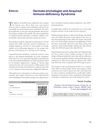 9 citations,
March 2000 in “PubMed”
9 citations,
March 2000 in “PubMed” Most women in the study lost hair due to stress, fever, childbirth, surgery, or thyroid issues, with low hemoglobin levels also common.
3 citations,
September 1994 in “Indian Journal of Dermatology, Venereology and Leprology” Hair loss in women was often caused by stress, illness, childbirth, or low hemoglobin, with most cases being telogen effluvium.
 1 citations,
January 2006 in “Elsevier eBooks”
1 citations,
January 2006 in “Elsevier eBooks” Cats lose fur due to various reasons, including allergies, infections, genetics, hormones, diet, cancer, stress, and some conditions are treatable while others are not.
 March 2024 in “CRC Press eBooks”
March 2024 in “CRC Press eBooks” Telogen effluvium is a type of hair loss where more hair than normal falls out after stress or illness.
 August 2023 in “International Ayurvedic medical journal”
August 2023 in “International Ayurvedic medical journal” Improper diet, lifestyle, and stress are major causes of hair fall.
 March 2014 in “Journal of The American Academy of Dermatology”
March 2014 in “Journal of The American Academy of Dermatology” Vitamin D deficiency is common in temporary hair loss, and stress is often a suspected cause.
 July 2022 in “Nigerian journal of medicine : journal of the National Association of Resident Doctors of Nigeria”
July 2022 in “Nigerian journal of medicine : journal of the National Association of Resident Doctors of Nigeria” Androgenetic Alopecia (AGA) greatly lowers quality of life, causing stress and low self-esteem, with those seeking treatment experiencing more impairment.
 January 2012 in “Elsevier eBooks”
January 2012 in “Elsevier eBooks” Hair loss can cause emotional and social issues, and various treatments, including medication, surgery, and psychological support, are needed.
 34 citations,
October 2011 in “Pathology Research International”
34 citations,
October 2011 in “Pathology Research International” Behçet's Disease may be caused by genetic and environmental factors leading to abnormal immune responses, and stress management and new treatments could improve patient outcomes.
 4 citations,
September 2021 in “Frontiers in allergy”
4 citations,
September 2021 in “Frontiers in allergy” The conclusion is that understanding the complex relationship between allergies, autoimmunity, and psychological factors is key to treating skin disorders with itching.
 4 citations,
March 2021 in “International Journal of Dermatology”
4 citations,
March 2021 in “International Journal of Dermatology” COVID-19 and related stress may increase hair loss known as Telogen effluvium.

research Acne
4 citations,
January 2019 Acne is a common skin condition that can be influenced by diet, lifestyle, and hormones, and requires a treatment approach that includes psychological considerations.
3 citations,
April 2023 in “CRC Press eBooks” Hair loss can cause stress and needs different treatments based on its type.
 January 2022 in “Clinical Cases in Dermatology”
January 2022 in “Clinical Cases in Dermatology” Stress can cause temporary hair loss, which usually gets better after the stress is gone.
 January 2009 in “Springer eBooks”
January 2009 in “Springer eBooks” The document concludes that treating skin conditions should include psychological care and a multidisciplinary approach is essential for effective management.
 1 citations,
May 2017 in “InTech eBooks”
1 citations,
May 2017 in “InTech eBooks” Telogen Effluvium is a common hair loss condition that can be short-term or long-lasting and is often caused by stress, illness, or nutritional issues.
 January 2021 in “Reactions Weekly”
January 2021 in “Reactions Weekly” Man experienced lasting sexual issues and stress from finasteride, accused doctor of malpractice.
 January 2014 in “International Journal of Trichology”
January 2014 in “International Journal of Trichology” Hair changes are common in AIDS patients and can add to their financial and emotional stress.
 September 2003 in “Clinics in Family Practice”
September 2003 in “Clinics in Family Practice” Different hair diseases affect people during childbearing years, with treatments ranging from medication to psychological support.
 77 citations,
July 2020 in “Journal of the European Academy of Dermatology and Venereology”
77 citations,
July 2020 in “Journal of the European Academy of Dermatology and Venereology” Environmental factors, hormones, nutrition, and stress all significantly affect skin health and aging.
 30 citations,
April 1997 in “European journal of endocrinology”
30 citations,
April 1997 in “European journal of endocrinology” The document concludes that managing hirsutism involves identifying the cause, using a scoring system for severity, combining cosmetic and medical treatments, encouraging weight loss, and providing psychological support, while noting the need for more research on drug treatments.
 5 citations,
May 2021 in “International Journal of Infectious Diseases”
5 citations,
May 2021 in “International Journal of Infectious Diseases” A man experienced hair loss after getting COVID-19, which improved with treatment and might have been triggered by stress related to the illness.
 1 citations,
June 2022 in “Journal of Plastic Reconstructive and Aesthetic Surgery”
1 citations,
June 2022 in “Journal of Plastic Reconstructive and Aesthetic Surgery” Hair restoration surgeons have a 15% yearly risk of being sued, and while they often win, the process is stressful and costly.
 1 citations,
December 2010 in “InnovAiT”
1 citations,
December 2010 in “InnovAiT” The document concludes that accurate diagnosis and appropriate management are crucial for treating various hair disorders, which have significant psychological impacts.
 December 2010 in “Bariatric Nursing and Surgical Patient Care”
December 2010 in “Bariatric Nursing and Surgical Patient Care” Hair loss after bariatric surgery can be reduced by staying hydrated, eating enough protein, taking vitamins, managing stress, and possibly using biotin.
 April 2012 in “Lab Animal”
April 2012 in “Lab Animal” Early exposure to germs may protect against autoimmune diseases, lack of sex increases alcohol preference in fruit flies, a potential baldness treatment could involve blocking a specific receptor, skin memory cells help prevent re-infection, high-fat diets can affect brain cells related to weight, and the link between social status, stress, and heart disease in primates is unclear.
 89 citations,
October 1996 in “Dermatologic Clinics”
89 citations,
October 1996 in “Dermatologic Clinics” Alopecia areata is likely caused by a combination of genetic factors and immune system dysfunction, and may represent different diseases with various causes.
 30 citations,
November 2012 in “Anais Brasileiros De Dermatologia”
30 citations,
November 2012 in “Anais Brasileiros De Dermatologia” Diagnosing diffuse alopecia, a hair loss condition, can be challenging and may require a scalp biopsy or tracking the disease's progression when symptoms and skin tests aren't enough.
3 citations,
August 2022 in “International Journal of Molecular Sciences” COVID-19 can cause hair loss, and treatments like PRP and stem cells might help.
 3 citations,
April 1978 in “PubMed”
3 citations,
April 1978 in “PubMed” The study concludes that traction alopecia, caused by hair styling, can help understand telogen effluvium, a condition of excessive hair loss.



























